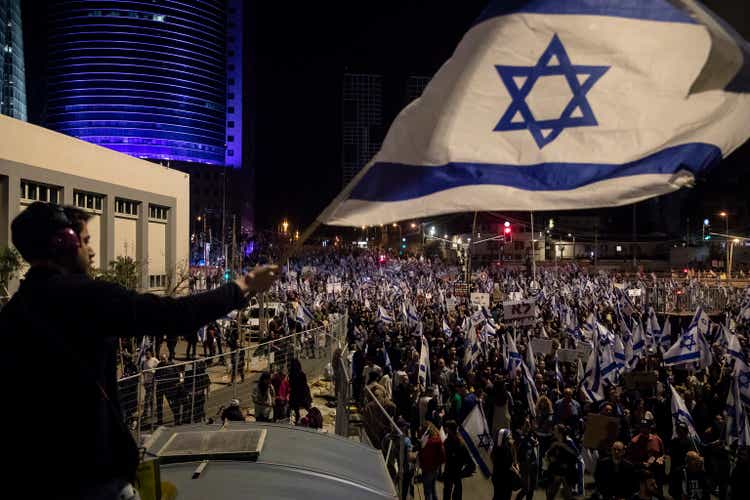Israel pauses judicial reforms: What it means for the tech sector
Amir Levy/Getty Images News
Israel has been rocked by weekly protests since a series of judicial reforms were unveiled in January, but the situation came to a head on Monday, as coalition divisions became apparent and the country's largest labor union threatened to shut down the country. Flights were grounded at Ben Gurion international airport, ports, banks and schools began to close, while a strike by the medical association left hospitals with skeleton crews. Earlier, military reservists from key units had refused to serve, triggering national security threats, and while Defense Minister Yoav Gallant flagged the concerns, he was fired for calling for a pause to the legislation.
Taking a timeout: "When it is possible to prevent a civil war through dialogue, I, as the prime minister, will take the time for dialogue," Bibi Netanyahu said in a televised address from Jerusalem. "Out of national responsibility, and to prevent a rift in the nation, I decided to postpone the legislative process in order to reach a wider agreement and broad consensus. In one way or another, we are going to bring a reform that will restore the balance of power."
The crisis has unsettled investors, sending the country's currency, the shekel, plummeting against the dollar. One of the big worries is that the reforms could hinder Israel's ability to attract capital inflows and maintain investment, making waves in the country's tech sector, which is responsible for over half of its total exports. Credit rating agencies have also flagged longer-term risks associated with the weakening of institutions that could hurt the broader economy.
Big players in the Israeli tech scene include Amdocs (DOX), Check Point (CHKP), Elbit Systems (ESLT), Fiverr (FIVR), NICE (NICE), Tower Semiconductor (TSEM) and Wix.com (WIX), while tech funds include the ARK Israel Innovative Technology ETF (BATS:IZRL) and the BlueStar Israel Technology ETF (NYSEARCA:ITEQ).
What are the reforms about? Both sides maintain that they are defending the soul of Israel's democracy, but disagree on the appropriate balance of power between the branches of government. Arguments center around the process of appointing judges, jurisdiction of the Supreme Court, as well as standing and override mechanisms. Complicating the situation is that Israel does not have a written constitution, but rather a series of basic laws, meaning policy and value judgments play an outsized role, while there also are fewer checks on executive and legislative functions, with no second chamber or the concept of a presidential veto.